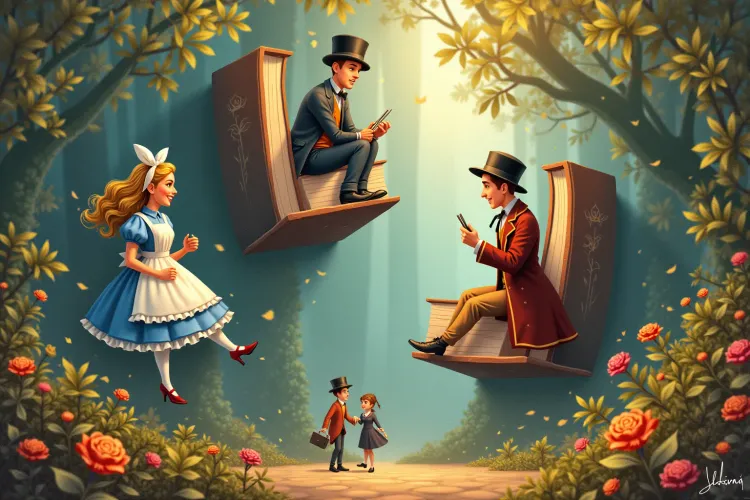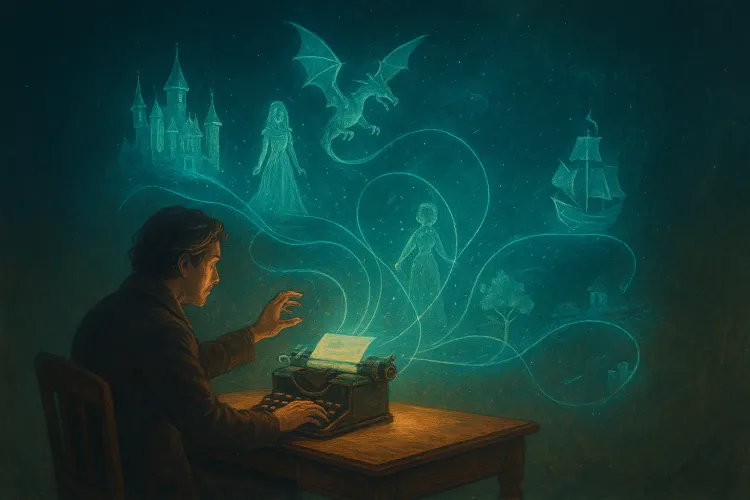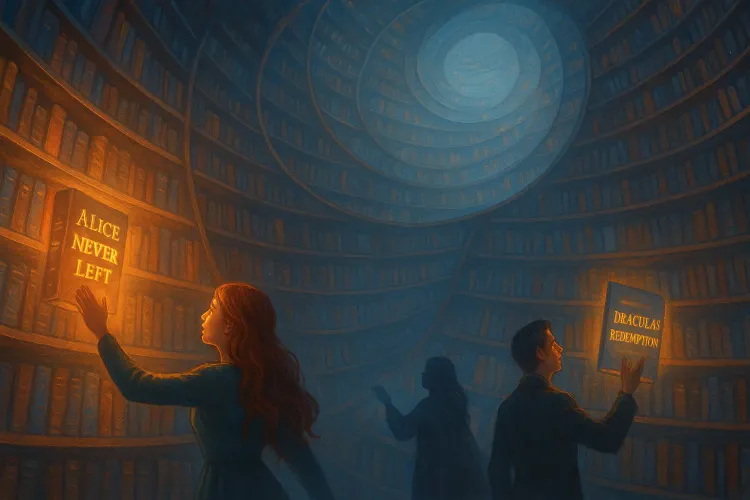With Fablecast, we're trying something different. Building worlds that last.
I get really frustrated when a book series I love or a TV show I enjoy watching ends. Sometimes there's a really satisfying conclusion but more often than not it dies out with a bit of a whimper. Characters you've grown to love just... stop. Worlds you've mentally inhabited for years suddenly have walls you can't cross anymore.
At Fablecast, we care about both worlds and the stories that happen in those worlds. But more importantly, we care about what happens when those two things stop being separate entities and start being one living, breathing experience that never has to end.
Worlds: Your Permanent Vacation Destinations
Great works conjure up detailed worlds for your mind to feast on. Fantasy and Sci-Fi have free reign and take advantage of it to create magical lands you can't actually visit – without Fablecast, of course. Even historical fiction or a modern detective novel builds a rich world around the protagonists. Places can be real or imagined, but vivid descriptions that transport you there are what keep me coming back.

We built Fablecast so you can walk around your favourite worlds and explore, hang out, or even cause mischief. Explorer mode – as we like to call it – is like playing in a sandbox. All the elements are there and react to you, but you can always create a new copy of the world and start again. Just like knocking down your sandcastles.
Your world is private to you though, and the actions you take have real consequences. If you pick a fight with a merchant, don't expect them to treat you warmly next time. When you drive your car across town and take the bus back, don't expect to find it in your driveway. The world remembers, adapts, and evolves based on your presence in it.
The Queen of Hearts continues her croquet game whether you're there or not. Holmes takes other cases while you're away. The world breathes on its own, making your return visits feel like coming back to a place that missed you, not a paused game waiting for you to press play.
Stories: The Heartbeat of Living Worlds
Even the most richly detailed world building can get boring eventually, unless there are events happening to change that world. This is how we think about stories – the flow of things that happen in the world. Maybe you're the hero trying to prevent bad things from happening, or maybe you're more of an observer investigating the events that unfold. Maybe you're the chaos agent making things happen just to see what breaks.
The twists and turns of great storytelling are still done better by humans than AI. We want to bring human stories into those dynamic and personal worlds and let you experience them with your own level of involvement. But here's where it gets interesting: in Fablecast, stories aren't rails you ride on. They're currents in an ocean you're swimming in. You can follow them, fight against them, or swim to a completely different part of the sea.
If you ever run out of authored stories though, the storyteller is able to craft something on the fly. You might not be ready to put down that world you've built together and the characters you've created. Your enjoyment shouldn't be cut short when a series of stories comes to an end. Instead, the storyteller will step up and craft something just for you – taking into account everything you've done, everyone you've met, and every change you've made to the world.
The AI doesn't just generate random events – it understands narrative structure, character arcs, and dramatic timing. It knows when you need a quiet character moment and when you're ready for the dragon to attack.
Myths and Legends: Bringing it all together
Experiencing a story can be how you learn about the world too. Discovering Dracula's aversion to sunlight teaches you about the rules of the world. The mythology that underpins a world should come out through the stories told within it. When you bring sandbox worlds, deep mythology and lore, and carefully crafted stories together you get magic.
But here's what makes Fablecast different: the mythology isn't just backstory you read in a codex or hear in exposition dumps. It's alive, reactive, and discoverable through your actions. When you test whether garlic really repels vampires, you're not checking a wiki – you're conducting an experiment in real-time. When you ask the Cheshire Cat about the origins of Wonderland's madness, you might get a riddle that leads to a hidden grove where the first mad tea party occurred centuries ago.
The Classics as Playgrounds
Why did we start with Alice in Wonderland, Dracula, and The Adventures of Sherlock Holmes? These are worlds people have been mentally inhabiting for over a century. Every reader has imagined themselves falling down that rabbit hole, deducing alongside Holmes, or facing off against the Count.

These stories have proven their replay value through countless adaptations, reimaginings, and expansions. Every generation finds something new in them. Fan fiction writers have been doing this work manually for decades – creating "what if" scenarios, alternate timelines, perspective shifts. They've asked questions like:
- What if Alice never left Wonderland?
- What if Watson was the real detective?
- What if Mina Harker became the vampire hunter chasing after Dracula?
Fablecast is giving them AI-powered tools to make those explorations real-time and responsive. You're not just reading about these possibilities – you're living them. When you suggest to Holmes that the supernatural might be involved, he doesn't just dismiss you with a pre-written line. He argues with you, using logic and examples from your shared cases. When you refuse to leave Wonderland, the world adapts to you becoming a permanent resident.
These classics are perfect playgrounds because they're both deeply familiar and endlessly mysterious. We all know Holmes lives at 221B Baker Street, but who lives at 220 Baker Street? We know the Mad Hatter's tea party never ends, but what happens if you convince them to try coffee instead?
The Author's New Canvas
This is where things get really exciting for creators. Traditional authors write one path through their world. They decide that Lucy dies, that Holmes solves the case, that Alice wakes up. They craft a single, perfect journey through their imagination.
But Fablecast authors? Now they're world architects. They're creating possibility spaces. Like the best tabletop RPG module writers, they're not writing what happens; they're defining what could happen.

Consider Dracula. In Stoker's novel, Lucy Westenra dies and becomes a vampire. That's the story. But in a Fablecast adaptation, an author can define Lucy's condition and its progression triggers, the tools and knowledge available to the protagonists, the vampire's rules and limitations, and the motivations and capabilities of each character. But whether Lucy lives, dies, becomes something unexpected, or maybe even becomes the hero of her own story? That's between you and the storyteller.
This is a fundamental shift in creative writing. Authors become designers of narrative systems rather than dictators of outcomes. They're creating:
Narrative Pressure Points: Moments where player choice fundamentally redirects the world. Not just "turn left or right" but "do you betray Van Helsing to Dracula?"
Character Motivation Engines: Not just what NPCs do, but WHY they do it. The Mad Hatter isn't just mad – he's mad because of mercury poisoning from his hat-making days. Now the AI understands how he'll react to any situation.
Elastic Plot Threads: Stories that can stretch, contract, or weave together based on player interest. If you spend three hours investigating the Caterpillar's hookah smoke, that becomes important. If you ignore the main plot to start a detective agency with the White Rabbit, the world adapts.
Your Story, Your Canon
Here's the radical truth: your Wonderland where you befriended the Cheshire Cat is as "real" as Carroll's original. Your Victorian London where Watson is the true genius and Holmes is the side-kick is as valid as Doyle's stories. Your Transylvania where Mina Harker becomes the lead vampire hunter is as legitimate as Stoker's novel.

We're not replacing the classics. We're making them infinitely explorable. Each playthrough becomes its own canonical version, as real and meaningful as any adaptation Hollywood might produce. Except this one is yours alone, crafted by your choices, shaped by your curiosity, and remembered forever in your personal world.
Welcome to Fablecast. Your worlds are waiting.
Ready to explore the classics like never before? Join Fablecast AI and discover what happens when Wonderland remembers you, when Holmes needs your help, and when Dracula knows your name.